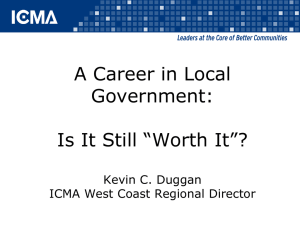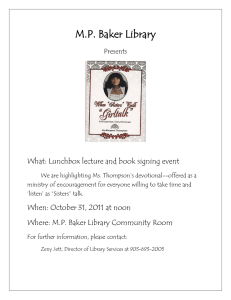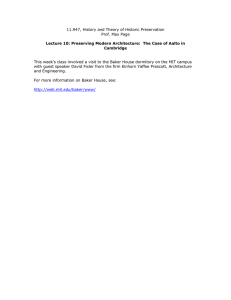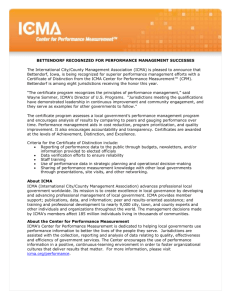URBS 401/501: Foundations Wednesdays, 9:00 – 11:45 MH 112
advertisement
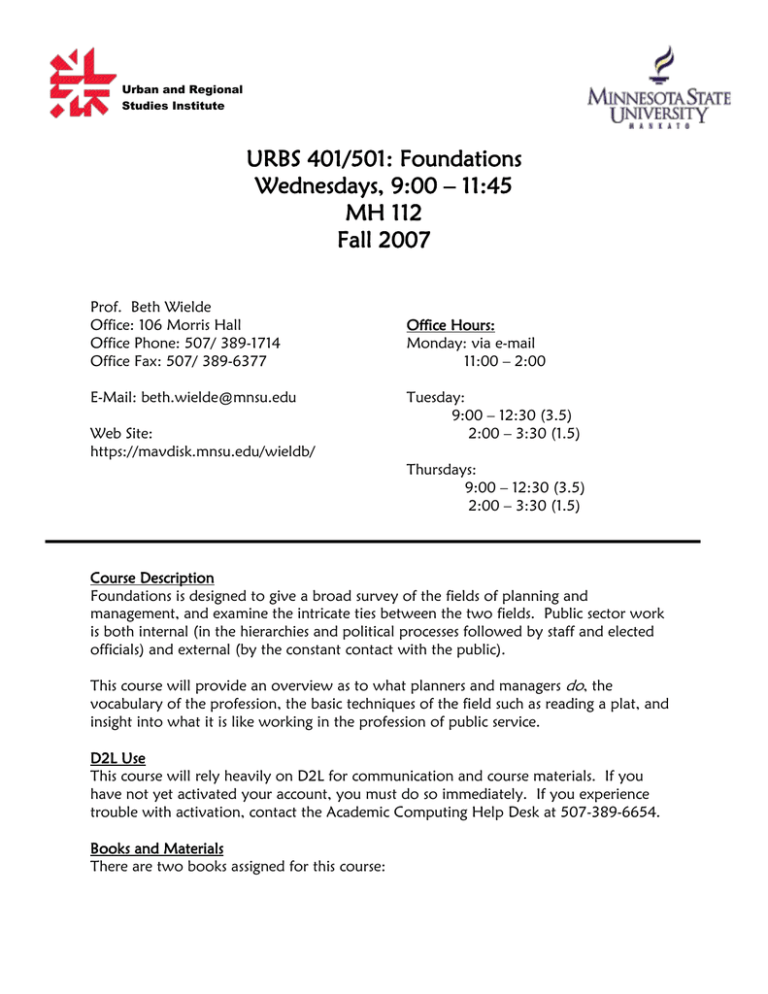
Urban and Regional Studies Institute URBS 401/501: Foundations Wednesdays, 9:00 – 11:45 MH 112 Fall 2007 Prof. Beth Wielde Office: 106 Morris Hall Office Phone: 507/ 389-1714 Office Fax: 507/ 389-6377 E-Mail: beth.wielde@mnsu.edu Web Site: https://mavdisk.mnsu.edu/wieldb/ Office Hours: Monday: via e-mail 11:00 – 2:00 Tuesday: 9:00 – 12:30 (3.5) 2:00 – 3:30 (1.5) Thursdays: 9:00 – 12:30 (3.5) 2:00 – 3:30 (1.5) Course Description Foundations is designed to give a broad survey of the fields of planning and management, and examine the intricate ties between the two fields. Public sector work is both internal (in the hierarchies and political processes followed by staff and elected officials) and external (by the constant contact with the public). This course will provide an overview as to what planners and managers do, the vocabulary of the profession, the basic techniques of the field such as reading a plat, and insight into what it is like working in the profession of public service. D2L Use This course will rely heavily on D2L for communication and course materials. If you have not yet activated your account, you must do so immediately. If you experience trouble with activation, contact the Academic Computing Help Desk at 507-389-6654. Books and Materials There are two books assigned for this course: Hoch, C., Dalton, L., So, F. (2000). The Practice of Local Government Planning (3rd Ed). Washington, D.C.: ICMA Press. Wood, L., Baker, J. (2003). Tales from the Trenches: Achievements, Blunders, and Challenges in Local Government Management. Rancho Palo Verdes, CA: The Training Shoppe. Course Grades Grades will be given based on a points systems. There are 105 points available for undergraduate students, 125 for graduate students. Course Tests/ Projects MID-TERM PROJECT (Due Oct 10, 30 points): Identify a contemporary planning issue and give a presentation that provides an overview of the issue. Look at the pros and cons of each issue. Make sure students don’t overlap the topics by having them ‘sign up’ for a topic. We can suggest some topics. Some ideas might be: Life cycle planning Obesity prevention planning Greenways and habitat Water resources planning Joint powers agreements – pros and cons Annexation Streetscaping Planning policy development Public participation Mixed use development Overlay zones Parks dedication fees/ payment in lieu Public acquisition of private property Brownfield PLANNING COMMISSION or CITY COUNCIL MEETING (20 pts): Students are expected to attend a meeting of the Planning Commission by October 17, and identify elements of classroom discussion that were applied to the meeting. Quiz - Elements of a Plat (Oct 24, 15 points): Students will identify the parts of a plat on a “real life” sample. 2nd MEETING (Grad Students Only) (20 pts): Graduate students are expected to attend a second meeting (if the student attended a planning commission meeting for the last assignment, they are to attend a City Council meeting this time, and vice-verse) by November 14, and identify elements of classroom discussion that were applied to the meeting. FINAL PROJECT (Due Dec. 5, 40 points); Students will meet/ interview a practicing planner, manager, or private sector consultant to gain insight into the realities of the profession. As an addition to the assignment, graduate students are expected to meet with the planner/ manager over time, following a project, issue, or plat, presenting the findings of their interaction with the official. Extra Credit By the time you reach this level in your academic career, you should be able to earn the grades you need based on performance of the requirements for the class. There is no extra credit option for URBS 401/501: Foundations Attendance Class attendance is crucial. The class is held only once a week, and missing one means missing a significant amount of material. Activity points can not be made up. You are responsible for procuring notes from another student. If you want to discuss the notes with me to clarify the material, I am happy to sit down with you – but you must bring notes along with you. This is to avoid “starting from scratch,” basically making me give a second lecture. Enrollment You must be enrolled in the course during the semester to earn a grade. I will not “hold over” a grade, allowing you to take the class one semester and officially enroll in another. This sometimes happens if the tuition bill cannot be paid, or there is another dispute on student status. Basic rule: if you don’t have D2L access, you cannot participate in the class. Students with Disabilities MSU provides students with disabilities reasonable accommodation to participate in educational programs, activities, or services. Students with disabilities requiring accommodation to participation in class activities or meet course requirements should first register with the Office of Disability Services, located in 0132 Memorial Library, telephone 507/ 389-2825, TDD 711, and then contact me as soon as possible. Cheating, Plagiarism, and Other Academic Fraud Simply put, don’t do it, even for extra credit. The worst original work is better than the most perfectly plagiarized. It’s okay to insert other people’s ideas, just make sure you cite them; after all, you would want credit for an idea you had, right? And remember, I’ve read and seen a lot of stuff; they actually pay me to do it, so do you want to take the odds that it’s a paper I’ve used for my dissertation research? Cheating is not tolerated in any case. If you are caught cheating (and both the T.A. and I are watching!), you will receive an automatic ‘F’ for the class and your case will be handled according to University policy. General Education Requirements This course does not fulfill a General Education category requirement. This course fulfills an URSI Undergraduate Core requirement This course fulfills an URSI Graduate Core requirement Course Schedule (Subject to Change) Date Topic Part 1: Government in Context 01: Aug 29 NO CLASS SESSION (Prof. Wielde at APSA conf) 02: Sept 5 Government in Context 03: Sept 12 Government and Working with the Public Intergovernmental Relations Part 2: Planning 04: Sept 19 Planning Basics History Ethics & Principles (Instructor: David Laverny-Rafter) 05: Sept 26 Planning Resources and Technology Comp Planning 06: Oct 3 Operational Planning Zoning Basics Reading a Plat Economic Development Urban Design 07: Oct 10 Planning Comparative future planning theory - Sky City vs. City in a Pyramid 08: Oct 17 Trends: Environmental Policy Sustainable Development (Instructor: Raymond Asomani- Boateng) Part 3: Management 09: Oct 24 Mgmt Leadership 010: Oct 31 Mgmt Communications Human Resources 11: Nov 7 Mgmt Budgeting and Finance 12: Nov 14 Mgmt Ethics Career Issues Part 4: Trends and Issues in Local Government 13: Nov 21 No Class Session Readings Wood and Baker, Ch 8 ICMA, Chapter 18 Wood and Baker, Ch 6 and 7 ICMA, Ch 1 and 2 (pgs 19 – 25) ICMA 2 (pg 25 – end), and 3 ICMA, Ch 12, 13, 14 MID TERM PROJECT DUE ICMA Ch 8 Wood and Baker, Ch 1, 2 Assessment of Planning Commission or City Council Meeting DUE Wood and Baker, Ch 3, 4 Quiz: Elements of a Plat Wood and Baker, Ch 5 ICMA Ch 16 Wood and Baker, Ch 10 Wood and Baker, Ch 11 Assessment of 2nd Meeting DUE (Grad only) 14: Nov 28 15: Dec 5 16: Dec 12 Other Departments: Public Works, Emergency Management Trends: Housing Transportation Discussion: Findings from Meetings Graduate Student Presentations ICMA, Ch 9, 10 Findings from Council/ APC Meetings As Assigned FINAL PROJECT DUE
